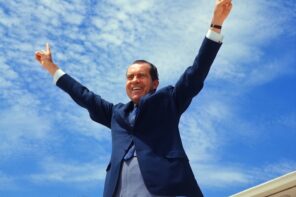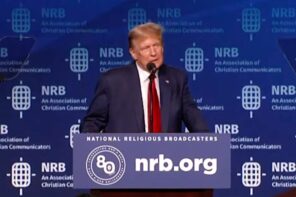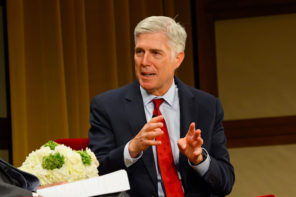As I predicted last February here on RD, Catholic voters have turned into an acute problem for Donald Trump. A recent PRRI poll showed Hillary Clinton leading Donald Trump among Catholics by 55 to 32 percent, a stunning 23 point gap. Similarly, a Washington Post/ABC news poll found Catholics have swung toward Clinton by the most dramatic margin of any demographic group—25 percent—with the exception of white, college-educated women, who have swung by a similar margin. As a result, notes Aaron Blake of the Post:
“Trump is basically adding 5 to 7 percentage points to Clinton’s overall margin. If 25 percent of the electorate is Catholic, Clinton is currently taking 14 to 15 points worth of that chunk, while Trump is taking 8 or 8.5 points.”
There’s been a lot of ink spilled trying to figure out the Catholic stampede away from Trump—which is all the more stunning because, after a bit of hemming and hawing, evangelicals have clearly embraced The Donald. Prime suspects include Trump’s trash-talking of Pope Francis after the pope criticized his “beautiful wall” as un-Christian, and his harsh rhetoric around immigrants. Catholics who trace their roots to nineteenth century populations of Irish, Italian, German and Polish immigrants retain a vestigial memory of the vehement anti-Catholic and anti-immigrant backlash their grandparents and great-grandparents faced. They may be particularly turned off by Trump’s promises of mass deportation and his categorization of immigrants as rapists and murderers.
But it’s also possible that the great Catholic stampede of 2016 isn’t exactly what it seems.
Writing in New York, Ed Kilgore notes that the PPRI poll may be an outlier, as it showed a 13-point lead for Hillary Clinton among all voters, which was among the larger post-convention leads of any poll. Also, as Kilgore points out:
National Election Study numbers show that Catholics in recent elections lean more toward Democrats (e.g., showing Obama winning the Catholic vote by 14 points in 2008 and 9 points in 2012) than do the less accurate exit polls [Washington Post writer Aaron] Blake cites, meaning Trump is already at a disadvantage with that demographic. So it’s not clear that Trump’s standing is as catastrophic as the comparison between this one poll and the exits might suggest.
Kilgore says it’s Trump’s disastrous showing among Latino Catholics that’s largely driving the trend and the PPRI poll shows Trump losing that group by a 13-76 margin to Clinton. But as Blake notes, however, the “real movement” has been among white Catholics, who since 2010 have been breaking toward the GOP by historic margins. By 2014—which now appears to be a high point—53 percent of white Catholics said they favored the GOP, versus 39 percent who favored the Democrats. But in the PPRI poll, Trump is losing white Catholics to Clinton by three points.
While significant from the perspective of recent trends, however, even that number must be put into perspective. When discussing “Catholics” for the purposes of politics it’s important to remember E.J. Dionne’s famous maxim that “there is no Catholic vote, but the Catholic vote matters.” That’s because the white Catholic vote tends to mirror the demographics of voters in key Northeastern swing states like Pennsylvania. And this explains some of the white Catholic “movement” away from Trump, especially vis-à-vis the evangelical vote. As a group, Catholics are both better educated and financially more well-off than evangelicals.
But a deeper dive into some of the polling around the “Catholic vote” does suggest there is indeed something interesting afoot that counters recent electoral alignment trends. As FiveThirtyEight reported earlier this year, “Catholics who attend Mass weekly have increased their support for the Democratic nominee by 22 percentage points relative to 2012.” This is significant because weekly church attendance has proven a reliable marker for more conservative Catholics, and it’s this group—white, regular church-going Catholics—who have been moving toward the Republican Party with alacrity since 2000, even as the overall Catholic vote has leaned somewhat Democratic because of the increase in Hispanic Catholics.
These are the Pope John Paul II Catholics who were attracted to the GOP because of its strong opposition to abortion and same-sex marriage and its emphasis on traditional family and cultural values. Why would these Catholics even consider voting for Hillary Clinton, who has been demonized as a pro-choice feminist for 20 years?
For one thing, they no longer have bishops telling them not to. If it seems awfully quiet in the Catholic trenches this year, that’s because for the first time in some 15 years there isn’t a clutch of powerful prelates telling Catholics they’re going to hell if they vote for pro-choice Democrats and intimating they have the Vatican to back them up.
This is partly due to the influence of Pope Francis, who has let it be known that such blatant politicking is no longer welcome, and partly due to their own hubris. Cardinal Bernard Law? Disgraced by the “Spotlight” scandals and packed off to Rome (where he is enjoying a cushy retirement). Cardinal Francis George? Deceased. Cardinal Timothy Dolan? Wised-up and politic enough to know that there’s no point in going against the Francis tide (although he couldn’t resist calling out pro-choice Catholics, claiming some kind of trademark on the word “Catholic”). Cardinal Raymond Burke? Cooling his heels in a ceremonial role after a humiliating demotion by Pope Francis for publicly opposing his effort to modernize family doctrine. That pretty much leaves Cardinal Charles Chaput shouting in the wilderness.
It’s no coincidence that the high point of white Catholic defection from the Democratic Party coincided with the period of 2012 through 2014, when the Catholic bishops made opposition to the contraceptive mandate in the Affordable Care Act the centerpiece of their “religious liberty” campaign and repeatedly accused the administration of attacking religious conservatives. According to Pew, between 2009 and 2014, the number of white Catholics who said the Obama administration—and by inference the Democratic Party—was “unfriendly to religion” skyrocketed from just 17 percent to 36 percent.
This year’s Democratic convention may also have helped erase the idea that the Democrats are unfriendly to religion and made the party more welcoming to wayward white Catholics.
As Catherine Rampell noted in the Post, “Democrats name-checked family values, faith, patriotism and the military, all topics traditionally more closely associated with Republicans.”
But the party went beyond “name checking” faith. From the Mothers of the Movement who spoke openly about how their Christian faith gives them strength to soldier on; to the Rev. William Barber’s electrifying speech, that, as Ari Berman said in The Nation, “put racial, social, and economic justice at the center of the 2016 campaign”; to VP nominee Tim Kaine talking about how his Catholic faith “became something vital” and the “north star for orienting my life” which led him toward a “battle for social justice”; the convention demonstrated faith in action. Unlike the Republican Party, which tends to see “faith” as a static concept like “patriotism” that’s either performed correctly or it isn’t, the Democratic Party highlighted progressive faith and values in a dynamic way—within the context of the most pressing social and economic justice issues, from racism to Islamophobia to poverty.
For younger Catholics, who don’t remember a church before Pope John Paul II, this social justice-focused party aligns with the moral message of both Pope Francis and his “fan,” Bernie Sanders, who in some ways was the most “Catholic” of candidates. And for older Catholics, it resonates with the values they learned as fundamental to Catholicism before John Paul made opposition to abortion the “north star” of the religion. It’s also a values vision that can appeal to the rising tide of millennial “nones” an increasingly important voting bloc.
Finally, there may be another, more elusive factor pushing Catholics away from Trump.
Evangelicals appear to be willing to overlook anything about Trump—the avarice; the divisive, cruel rhetoric; the affairs and divorces—in service of getting a candidate in the White House who has promised to appoint someone to the Supreme Court, “as close to Scalia as I could find.” This, presumably, would unleash some new conservative Golden Age and make genuflection before the Trump idol worthwhile.
Catholics, on the other hand, even the more conservative-leaning culture warriors, appear unwilling to give Trump a pass, even in the name of all that is holy to them: opposition to abortion and the restoration of Christian homogeny. Why? Steve Krueger, head of Catholic Democrats, told RD that, in essence, it’s not Catholics, it’s Trump:
I don’t think that it represents a shift in the political identity of White Catholics as much as it represents an intolerable assault by Trump on their Catholic sensibilities that are rooted in both faith and reason, culminating in his remarks over the summer. I believe that he has become a bridge too far for many White Catholics who have moved to the GOP. This has made it too difficult for them to reconcile their more conservative political beliefs with Trump the candidate … millions of White Catholics who had shifted to the GOP since 2009, for any number of reasons, are coming home for this election like prodigal sons and daughters of the Democratic Party.
Or, as Tim Kaine put it in a conference call on Friday with Catholic leaders, “Realities do have to be looked at from a faith perspective and we can’t let bad behavior go unpunished.” The call was part of the Clinton campaign’s stepped-up Catholic outreach, and it’s clear the candidate is looking to capitalize on its strength with Catholics. “I really feel like the Catholic vote is going to be critical to our success,” said Kaine.
If Catholics are acting on their values by punishing Trump for his bad behavior and evangelicals aren’t, this suggests that for many evangelicals, their faith has largely been in the service of politics, while for Catholics, faith, and the values that spring from it, appears to Trump politics.





